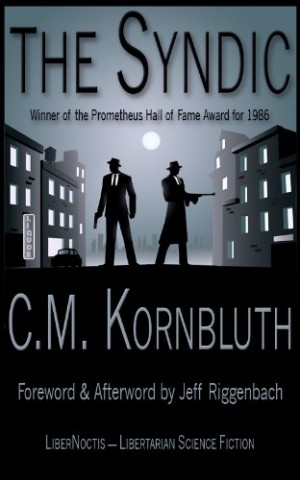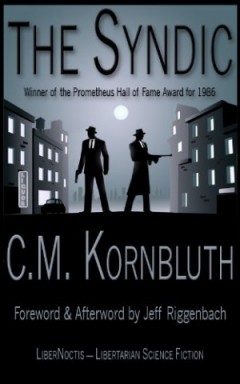
“What ifs” are the bread and butter of science fiction. What if organized crime overthrew the United States government and took over? What would life be like under the mafia? Would the people of North America be better off? These are the questions C.M. Kornbluth sought to answer in his science-fiction novel The Syndic (1953).
The Syndic is of interest to libertarians, not least because it was honored with the Prometheus Hall of Fame Award in 1986 by the Libertarian Futurist Society. This edition of the novel includes a forward and an afterward by Jeff Riggenbach that set the historical context for Kornbluth’s work and life and their relevance to libertarians. The Syndic is a fast-paced, entertaining tale replete with insights into the nature of the state and of war. Indeed, it could arguably be deemed an antiwar novel; but the insights do not end there.
As The Syndic opens, the continent of North America has long been divvied up between the Syndic and the Mob. The former United States government continues to exist in exile in Iceland and Ireland as the North American Government (NAG; an apt acronym). After an odd prologue composed of historical documents that set the stage for us, we’re introduced to our main viewpoint character, Charles Orsino, a low-ranking young bagman for the Syndic, who spends his days politely shaking down small businesses in the 101st New York Police Precinct for protection money and playing a brutal version of polo with jeeps and firearms instead of horses and mallets.
Charles happens to be the target of an assassination attempt during one night out on the town, and this lands him the rare opportunity to be invited to a meeting of the leaders of the Syndic. The North American Government is suspected of being behind the attempt as well as others, and Charles volunteers for an undercover mission to infiltrate NAG territory and assess the threat. From here on out an action-packed adventure with a touch of romance ensues that allows Kornbluth to contrast life in the Syndic with that under the NAG and the Mob.
The people of the Syndic territory have it pretty good. They enjoy a great deal more freedom and prosperity than people did under the old United States government or do under the NAG and the Mob. So long as they pay their protection money, they seem to be able to do most anything they please that’s peaceful. They don’t need permits to travel. There’s no bureaucratic welfare state, no war, no militarized police barging into their homes, no close regulation of business. Women enjoy equal legal status. The young are allowed to experiment, and yet society does not degenerate — on the contrary, most seem to settle down into normal lives by middle age.
Charles has frequent occasion to be horrified during his adventure outside of the Syndic — he likens the NAG military to particularly unscrupulous pirates — to the point that he’s ready to push for his leaders to raise an army and navy to wage an aggressive war against the NAG and the Mob to destroy their governments and civilize their people before they have a chance to invade, as they inevitably will. His uncle Frank, a respected member of the Syndic leadership, will have none of it, however. It is through Frank that we, and Charles, receive much of the aforementioned libertarian wisdom.

Uncle Frank understands the state and has a keen sense of history. He understands, as few today do, that laissez-faire works — until governments start to tinker with it. Regulations and other government interventions are not the products of wise, benevolent politicians and bureaucrats. Big, established corporations call for regulation of their own industry — under the guise of consumer protection, of course, but with the actual aim, or at least effect, of maintaining the status quo and hindering competition. Government intervention snowballs. A fiat paper currency fuels public debt, mounting inflation, and inequality. History has taught him it’s best not to meddle.
Frank frequently protests that the Syndic is not a government, but one gets the impression he does not mean this literally — at one point Charles admits that the Syndic is a government too — but rather as a warning to his fellow Syndic leaders not to behave like the Syndic is an abstract, permanent institution through which they have a right to rule for the good of the people. As Charles is wont to echo Frank, the Syndic is nothing more than “some people and their morale and credit.”
Frank understands that war is the health of the state. A standing military and a war will be a drain on their wealth. There will be much death and destruction, curtailed freedom at home, altered sensibilities, erosion of their carefree culture. The Syndic government itself would be forever changed if it embarked on the path of traditional government, centralizing and expanding its power, losing its meritocratic family- and business-like character. War would mean an end to their way of life — in the name of preserving it. The Syndic would become the very thing they meant to defend it against.
As Frank retorts to Charles: “Nothing can be a matter of life or death to the Syndic. When anything becomes a matter of life or death to the Syndic, the Syndic is already dead, its morale is already disintegrated, its credit already gone. What is left is not the Syndic but the Syndic’s dead shell.”
Despite its age, The Syndic is not a dead shell. It is a science-fiction classic that should be on every libertarian fiction-lover’s to-read list. It’s a short and quick, entertaining read — about half as long as the typical science fiction novel today, a quarter the length of the average epic fantasy novel. While characterization receives short shrift by contemporary standards, and events might feel a bit rushed to modern sensibilities, The Syndic’s strengths lie in its plotting and timeless ideas. The modern reader should be forewarned that attitudes toward women expressed within are rather old-fashioned, but the story is not without a strong female protagonist. Kornbluth’s prose is good and occasionally brilliant. I leave you with this little gem that culminates a bless-curse sequence:
“Bless the founding fathers for the exquisitely Newtonian eighteenth-century machinery of the Constitution, and curse them for visiting it in all its unworkable beauty on the nineteenth, twentieth, and twenty-first centuries.”
















Comments on this entry are closed.
Matthew Alexander October 12, 2012 @ 9:48 pm | Link
Sounds like it should do on my To-Read list. I love the cover, too. Is there a touch of noir in the tale?
Geoffrey Allan Plauché October 12, 2012 @ 10:40 pm | Link
I’m not sure it qualifies as noir. What do you think are the defining characteristics of noir?
I’d say it’s more of a spy-action-adventure tale. Probably doesn’t linger on setting and atmosphere as much as you’d like. It would probably be a better book if it did, but it would probably also have to ditch the fast-paced plot in favor of something that develops more slowly.